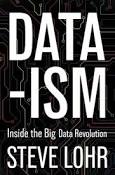Steve Lohr
A technology reporter for the New York Times, chronicles the rise of Big Data, addressing cutting-edge business strategies and examining the dark side of a data-driven world.
MEET STEVE LOHR
|
Steve Lohr reports on technology, business and economics. He was a foreign correspondent for The Times for a decade and served brief stints as an editor, before covering technology, starting in the early 1990s.
In 2013, he was part of the team awarded the Pulitzer Prize for Explanatory Reporting “for its penetrating look into business practices by Apple and other technology companies that illustrates the darker side of a changing global economy for workers and consumers.” He has written for magazines including The New York Times Magazine, The Atlantic Monthly and The Washington Monthly. He is the author of a history of computer programming, “Go To: The Story of the Math Majors, Bridge Players, Engineers, Chess Wizards, Maverick Scientists and Iconoclasts — The Programmers Who Created the Software Revolution” . |
SELECTED ARTICLES BY STEVE LOHR
The Patent, Used as a Sword Why the Economic Payoff From Technology Is So Elusive IBM Results Show Progress in Cloud and Data Analysis The Race Is On to Control Artificial Intelligence, and Tech’s Future Data-ismIn Data-ism, New York Times reporter Steve Lohr explains how big-data technology is ushering in a revolution in proportions that promise to be the basis of the next wave of efficiency and innovation across the economy. But more is at work here than technology. Big data is also the vehicle for a point of view, or philosophy, about how decisions will be—and perhaps should be—made in the future. Lohr investigates the benefits of data while also examining its dark side. Data-ism is about this next phase, in which vast Internet-scale data sets are used for discovery and prediction in virtually every field. It shows how this new revolution will change decision making—by relying more on data and analysis, and less on intuition and experience—and transform the nature of leadership and management. Focusing on young entrepreneurs at the forefront of data science as well as on giant companies such as IBM that are making big bets on data science for the future of their businesses, Data-ism is a field guide to what is ahead, explaining how individuals and institutions will need to exploit, protect, and manage data to stay competitive in the coming years. With rich examples of how the rise of big data is affecting everyday life, Data-ism also raises provocative questions about policy and practice that have wide implications for everyone. The age of data-ism is here. But are we ready to handle its consequences, good and bad? |


